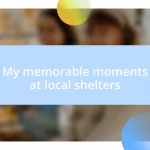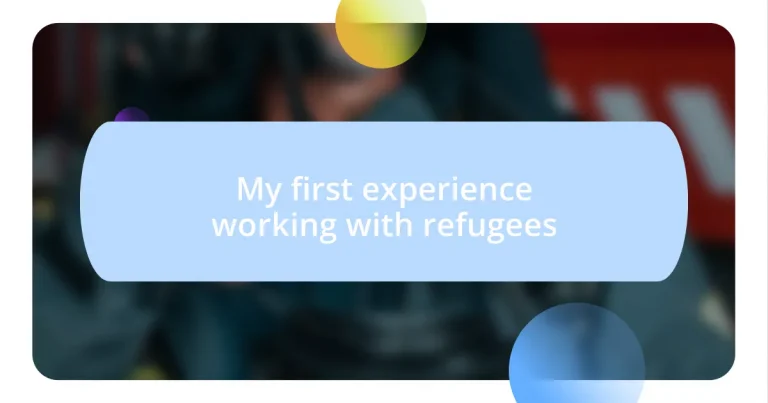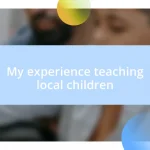Key takeaways:
- Refugees often face significant emotional challenges, including language barriers and bureaucratic navigation, which can lead to feelings of hopelessness and anxiety.
- Building relationships with refugees requires empathy, patience, and active listening, as these elements foster trust and genuine connection.
- Identifying and facilitating access to local resources and services is essential for creating a supportive environment for refugees.
- Advocating for refugee rights is crucial, as it involves amplifying their voices and addressing systemic barriers that limit their potential and access to basic needs.
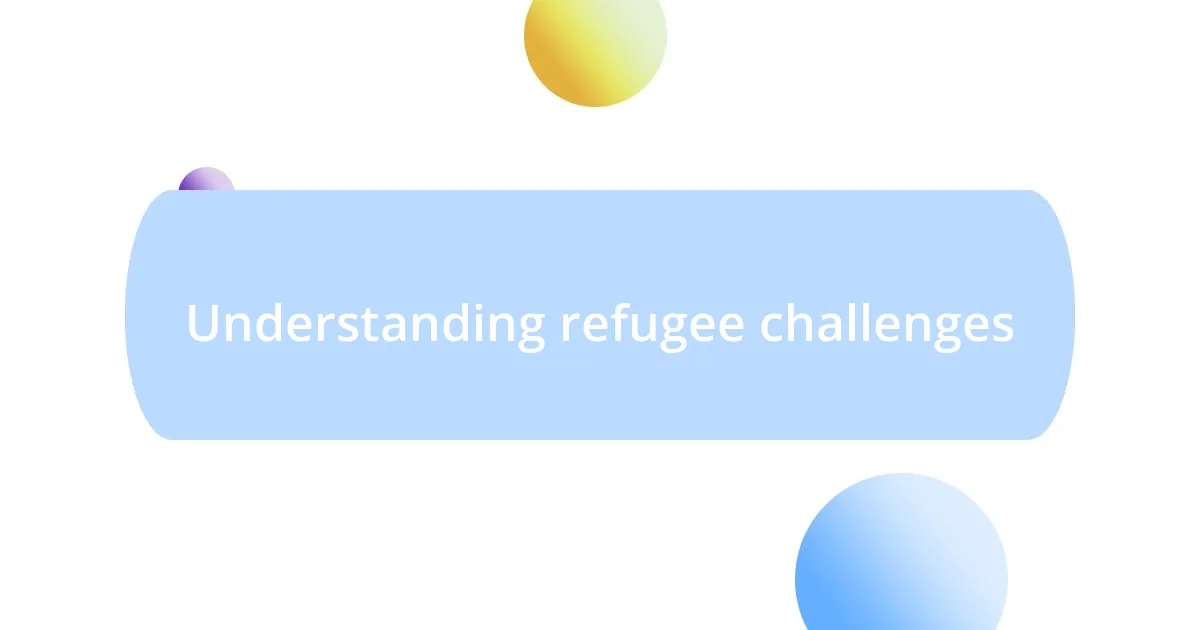
Understanding refugee challenges
Understanding the challenges refugees face is crucial. From my experience volunteering at a local shelter, I witnessed the profound emotional toll that displacement inflicts. Imagine arriving in a new country, with nothing but a small bag and a heart full of hopes and fears—how would that feel?
One specific challenge that struck me was the struggle for language. There was a young mother from Syria who could barely communicate her needs. Just picture being in an unfamiliar place, trying to explain to a shopkeeper that your child is hungry. It’s not just about words; it’s about human connection and dignity. I remember her expression of frustration and vulnerability—it’s a feeling that lingers long after the encounter.
Additionally, there’s the overwhelming burden of navigating legal and bureaucratic systems. Many refugees find themselves lost in a maze of paperwork, not to mention the uncertainty that often accompanies it. I’ve seen how this can lead to feelings of hopelessness, as days turn to weeks and weeks to months without clarity. Can you imagine the anxiety of waiting for that next piece of paper to determine your family’s future? It’s a challenge that goes far beyond mere logistics; it touches the core of a person’s sense of security and belonging.
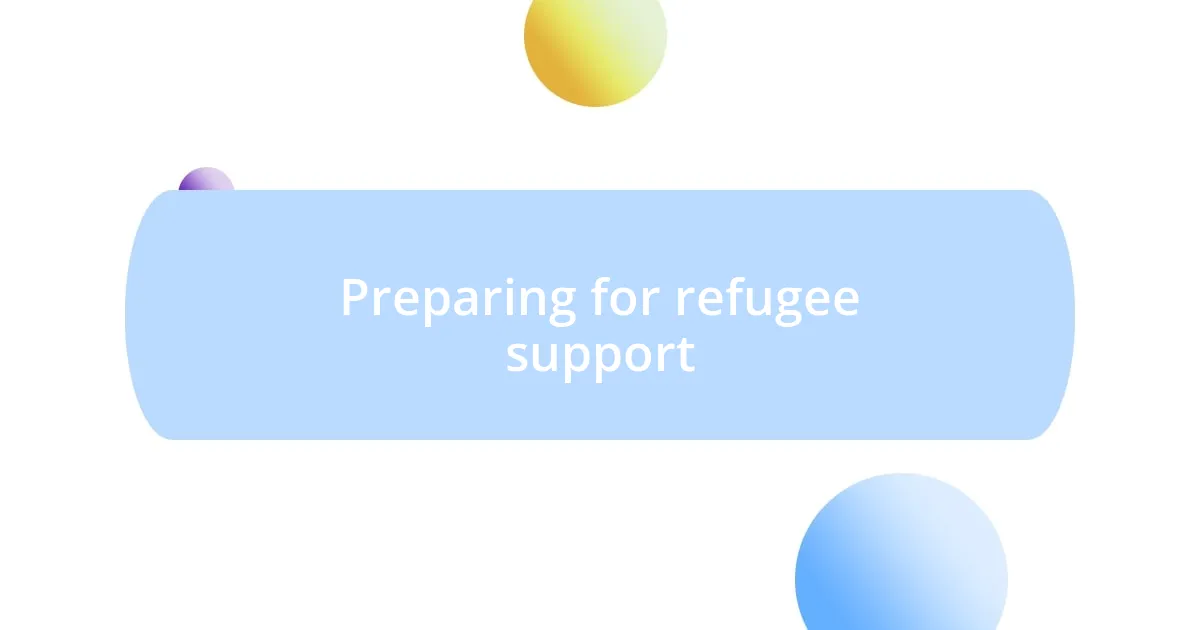
Preparing for refugee support
Preparing to support refugees involves a combination of emotional readiness and practical knowledge. I distinctly remember the anticipation I felt before my first volunteer shift—nervous yet eager, knowing I would meet people whose stories would change my life forever. I learned that immersing myself in the culture and struggles of refugees was essential. It required me to approach them with patience, understanding, and an openness to learn.
Here are some vital aspects to consider while preparing for refugee support:
- Cultural Sensitivity: Familiarize yourself with the cultural backgrounds of the refugees you will be assisting. This knowledge fosters respect and builds trust.
- Basic Needs Awareness: Understand the immediate needs of refugees, such as food, clothing, and shelter, and how you can help meet these needs.
- Emotional Preparedness: Be ready to handle emotional situations. I often found myself in tears after listening to heartbreaking stories. It’s okay to feel deeply.
- Resource Availability: Research local services and resources that support refugees, such as legal aid or mental health services, so that you can direct them effectively.
- Communication Skills: Develop basic phrases in their language or learn about non-verbal cues. This simple effort can bridge huge gaps and create a sense of comfort for the refugee.
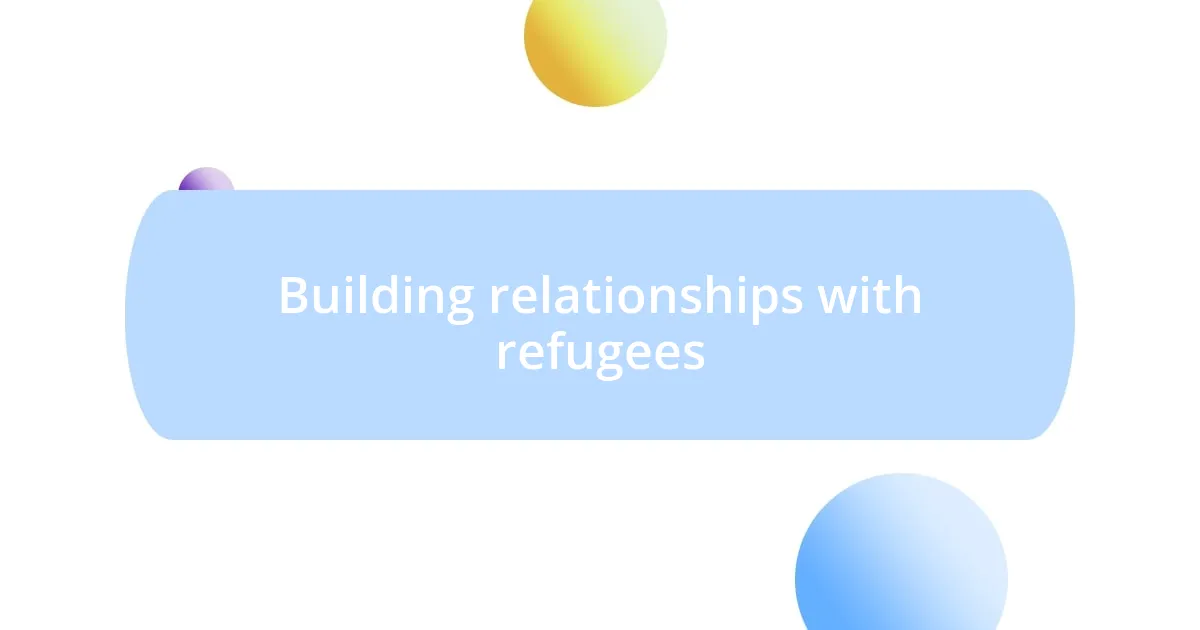
Building relationships with refugees
Building relationships with refugees is a deeply human experience that thrives on empathy and connection. I recall a touching moment when I sat down with a group of refugees from Afghanistan over some shared food. While the meal itself was simple, the laughter and stories exchanged were rich and meaningful. Eating together created an atmosphere of warmth and openness. It made me realize that sharing a meal can break down barriers that words sometimes fail to address.
The act of listening also plays a pivotal role in relationship-building. One afternoon, I met a teenager from Eritrea who shared his dreams of becoming an engineer. As he spoke, I noticed how his eyes lit up with hope, and it reminded me of the dreams I once held. Just by giving him the space to share, I felt like I was validating his experiences and aspirations. I’ve learned that showing genuine interest in someone’s story can ignite the bond between us. It’s as if we momentarily forget the differences in our backgrounds and join in on a shared journey.
Building trust takes time and patience; it’s not an instantaneous process. I remember a mother from Iraq who would initially avoid eye contact. After several weeks of consistent interaction, our conversations gradually became more engaging. She eventually opened up about her past, revealing a world of strength hidden beneath her initial hesitance. This journey taught me that patience is a form of love. It’s about being present and offering support, even when the connection feels distant at first.
| Building relationships | Elements of Connection |
|---|---|
| Shared Experiences | Cultural Exchange |
| Listening | Building Trust |
| Time and Patience | Empathy |
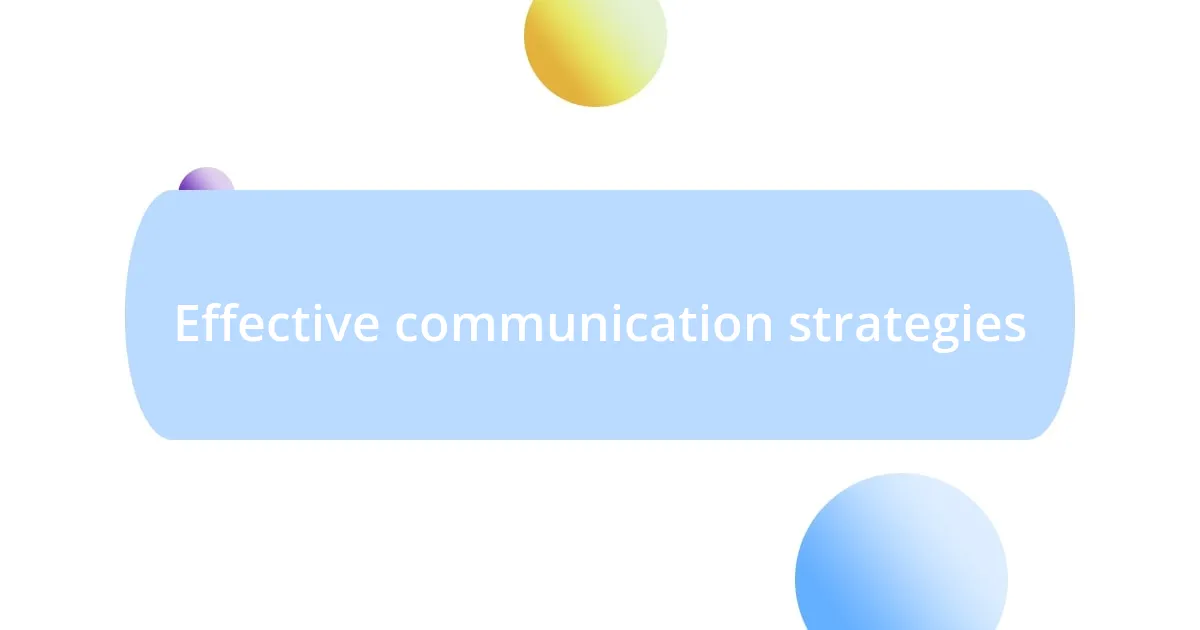
Effective communication strategies
Effective communication with refugees requires not only words but understanding and creativity. I vividly remember sitting with a group where our cultural barriers felt towering at first. I decided to bring along a few photos of my hometown, sharing with them the beauty of my culture. Their faces lit up as we exchanged stories, and it struck me how visuals can be a powerful tool, transcending language and allowing an emotional connection to blossom.
Another strategy that proved invaluable was using active listening. There were moments when refugees were hesitant or struggled to express themselves in English. I found it helpful to nod, maintain eye contact, and repeat back what they said, but in my own words. This not only conveyed that I was fully engaged but also encouraged them to continue, often leading to richer narratives. Isn’t it amazing how a simple act of understanding can lead to deeper dialogues and trust?
Sometimes, it’s the smallest gestures that have the greatest impact. I recall offering a young boy a drawing pad and some crayons one day. Instead of focusing on language barriers, we communicated through art. As I watched him draw, I could sense his joy and relief, and it struck me how effective silence can be when words fail us. It made me wonder—how often do we overlook non-verbal communication in our everyday interactions?
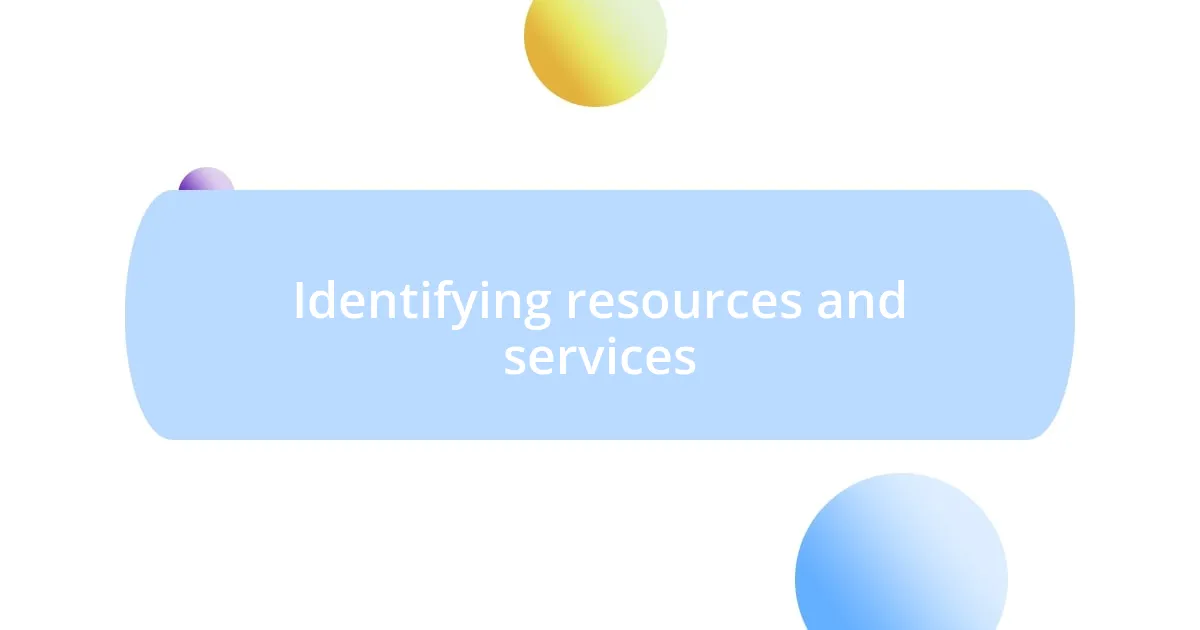
Identifying resources and services
Identifying resources and services for refugees is crucial in creating a supportive environment. Early in my experience, I realized that local community centers were treasure troves of information. I recall the day I visited one; the walls were lined with flyers detailing legal assistance programs, language classes, and healthcare services. It struck me how these resources could empower individuals to navigate their new surroundings, and I felt motivated to share this wealth of knowledge with the families I met.
As I connected with refugees, I often encountered moments where they expressed confusion about their rights and available services. One mother, overwhelmed by the complexity of her situation, revealed her fear of seeking help. This drove me to dig deeper into local organizations that specialize in refugee support. I remember connecting her with a local non-profit that offered not only legal advice but also community engagement activities. Seeing her face light up when she realized there were people ready to help was truly heartwarming.
I’ve come to appreciate how essential it is to not just identify resources but also to facilitate access to them. During one event, I organized a resource fair where different service providers set up booths. Many refugees attended, and I observed their curiosity and hope as they explored options. It made me wonder—how often do we underestimate the power of bringing people together to discover available support? That event reinforced my belief that facilitating access to resources is not just about sharing information; it’s about building a community of hope and resilience.
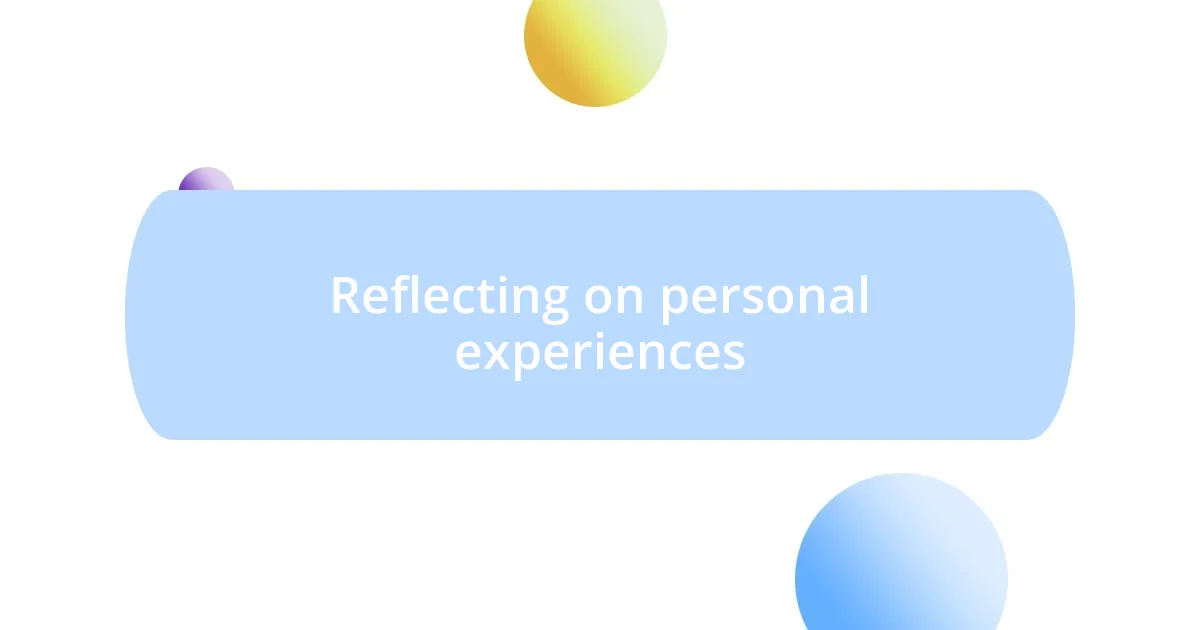
Reflecting on personal experiences
Reflecting on my experiences working with refugees has truly reshaped my understanding of resilience. I distinctly remember a conversation with a young woman who had fled her war-torn home. As she shared her story, her voice wavered, but her determination was palpable. I found myself leaning in, not just to hear her words, but to grasp the weight of her journey. How often do we take for granted the stability we have?
One poignant moment that stays with me is when a group of refugees showed me their handmade crafts. They were infused with their culture’s history and traditions, yet they seemed surprised when I expressed admiration. It struck me then—how could something born from their struggle also be a source of pride? I realized that their creativity was a powerful testament to human spirit, and it made me reflect: how can we better celebrate these stories amidst the challenges?
In another instance, I was invited to a celebration at a local community center. The room was alive with laughter and music, a stark contrast to the initial somber discussions I’d shared with them. Watching how they transformed their hardships into joy made me appreciate the healing power of community. It left me thinking: isn’t the ability to come together in joy a potent form of strength? Each reflection brings me closer to understanding the multifaceted nature of their experiences.
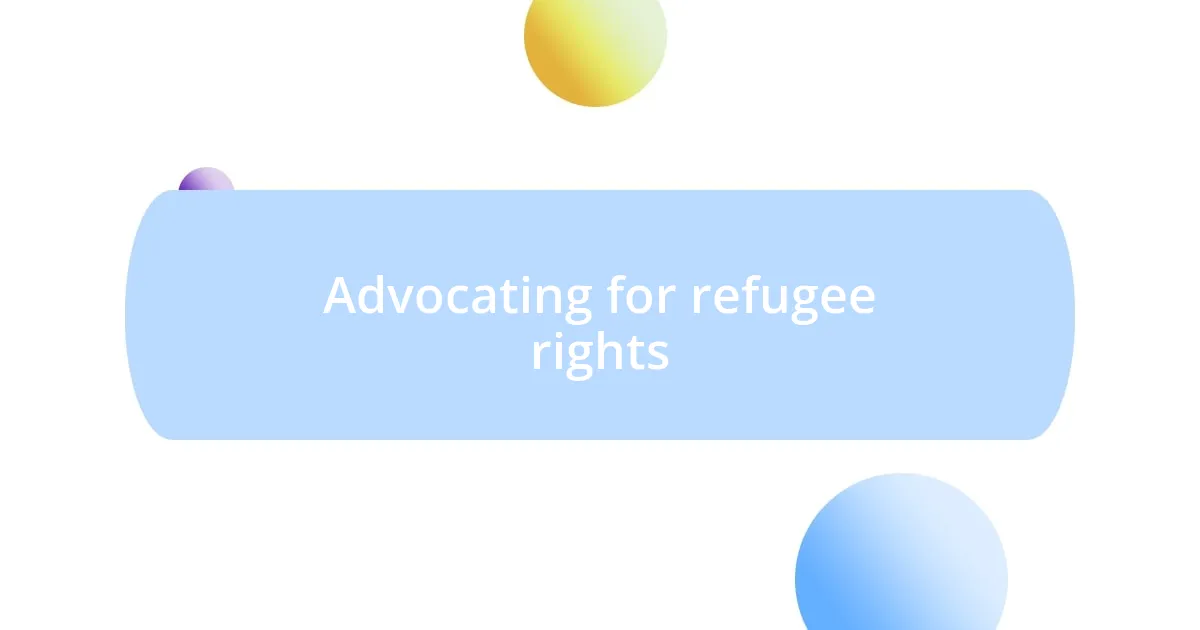
Advocating for refugee rights
Advocating for refugee rights has become a deeply personal mission for me. I remember attending a meeting where refugees gathered to voice their concerns about the limited access to education. Listening to a teenager share how he yearned to continue his studies but felt trapped in a system that overlooked him was heartbreaking. It made me ask—how can we stand by and allow such potential to go unrecognized? This encounter ignited a fire within me to advocate for equal educational opportunities for all.
I often think about the power dynamics at play when advocating for refugee rights. During a community event, I met a woman who had been denied proper healthcare because she lacked documentation. The frustration in her voice struck a chord with me; I found myself reflecting on my own privilege and the role I could play in changing the narrative. By connecting her with local health advocates, I could see her hope rekindled. It prompted me to ask: what if we all took an active role in dismantling the barriers they face? As advocates, our responsibility is to amplify their voices and challenge the systems that neglect their rights.
One memory I cherish involves a panel discussion on refugee rights that I helped organize. The room was packed with diverse individuals eager to learn and engage. As a refugee shared her experiences of discrimination and resilience, I felt a palpable shift in the audience’s energy. It was in that moment I realized how crucial it is to foster these dialogues. I often wonder—when we confront these uncomfortable conversations, do we not also grow in empathy? That evening reinforced my belief that advocacy is not just about policies; it’s about understanding, connection, and the shared humanity that binds us all.











